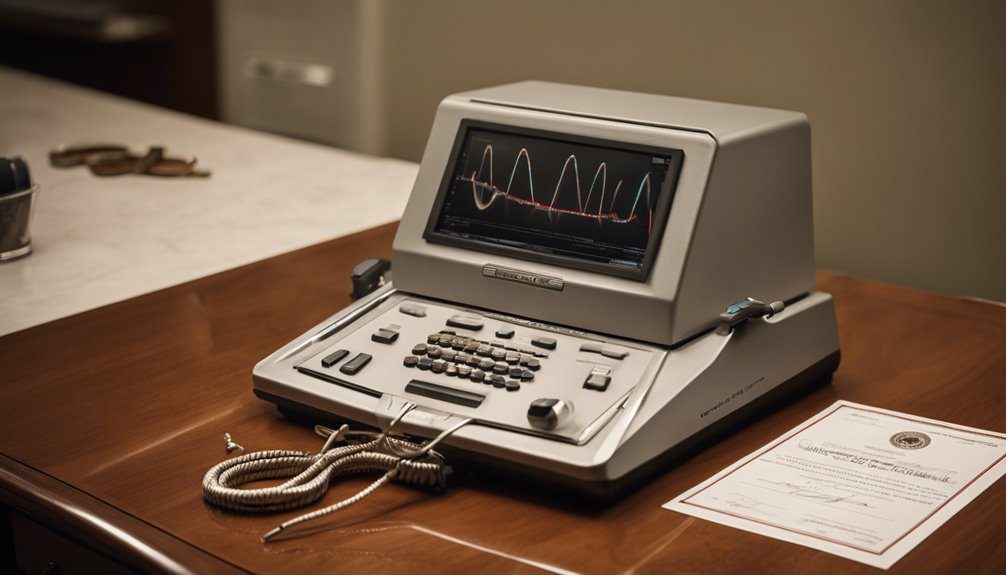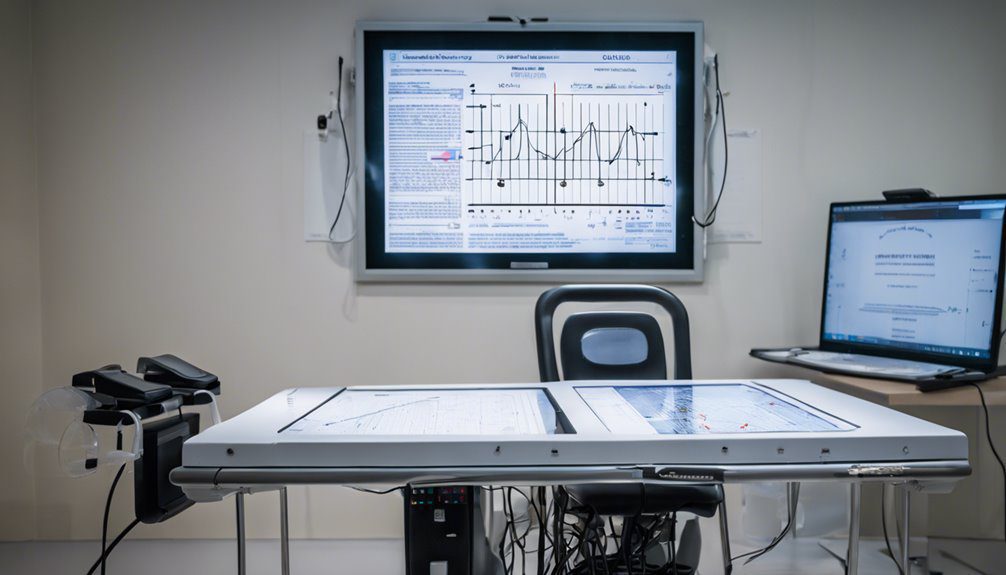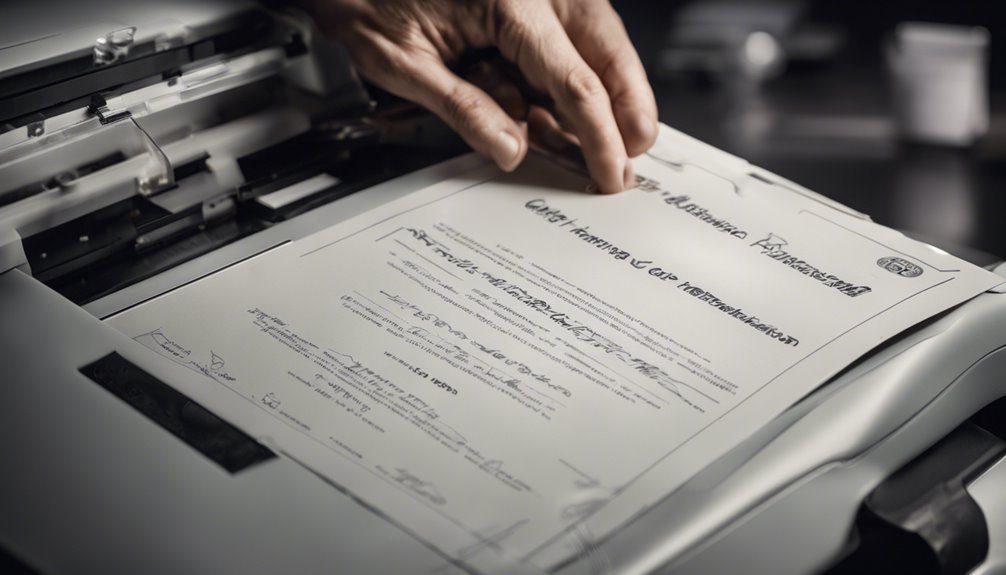When you think about the role of a polygraph examiner in South Carolina, the $5,000 bond becomes a significant element that shouldn't be overlooked. It's not just a financial requirement; it's a testament to the examiner's commitment to ethical practices and client trust. As you explore what this bond entails, you might find yourself questioning how it influences the overall integrity of the profession. What are the implications for both clients and examiners? Let's examine the details that could reshape your understanding of this essential aspect.
Overview of Polygraph Examination

Polygraph examination offers a fascinating glimpse into the intersection of psychology and technology. You might find it intriguing how this method measures physiological responses to determine truthfulness. During an examination, you'll be connected to sensors that monitor your heart rate, blood pressure, respiration, and skin conductivity. These measurements help the examiner identify any significant changes that might indicate deception.
As you answer a series of questions, the polygraph records your physiological responses in real-time. The examiner then analyzes the data, looking for patterns or irregularities.
It's important to note that while polygraphs are often seen as reliable, they're not foolproof. Factors like anxiety or medical conditions can influence your physiological responses, which may complicate the results.
While you might be skeptical about the accuracy of polygraph tests, they can still provide valuable insights in various fields, from criminal investigations to employment screenings.
Understanding how the polygraph works can help you prepare mentally for an examination. By knowing what to expect, you can approach the experience with clarity, making the process smoother and potentially more successful.
Importance of the ,000 Bond
When engaging in polygraph examinations, it's vital to understand the financial responsibilities that come with the profession. One key aspect is the ,000 bond, which serves as a safety net for both you and your clients. This bond demonstrates your commitment to ethical practices and provides financial security in the event of disputes or claims against you.
Having this bond not only protects your clients but also establishes your credibility in the field. It shows you're serious about your work and willing to take responsibility for your actions. In an industry where trust is paramount, this bond can enhance your reputation and attract more clients.
Moreover, the bond often acts as a deterrent against malpractice or negligence. Knowing you've got this financial obligation hanging over you can motivate you to adhere to high standards and avoid potential pitfalls. Additionally, securing this bond builds client confidence in your services, ultimately leading to a more successful practice.
Ultimately, the $5,000 bond is more than just a requirement; it's a vital part of building a trustworthy and successful polygraph examination practice. By securing this bond, you're investing in your professional integrity and setting yourself up for long-term success.
Eligibility Requirements for Examiners

To become a certified polygraph examiner, you'll need to meet specific eligibility requirements that ensure you're qualified for this sensitive role.
First, you must hold a high school diploma or equivalent. Many employers prefer candidates with a bachelor's degree in criminal justice, psychology, or a related field.
Additionally, you should have completed a recognized polygraph training program, which typically lasts several months and covers both theory and practical skills.
Experience matters, too. Most states require you to have a certain amount of supervised practice, often ranging from 200 to 400 hours, before you can work independently.
You'll also need to pass a comprehensive examination to demonstrate your knowledge and skills in polygraph techniques.
Background checks are common, as integrity is crucial in this profession. You may have to provide references or proof of your ethical standing.
Lastly, some states might have additional requirements, like specific continuing education credits to maintain your certification.
Make sure you research the rules in your area to ensure you meet all criteria before applying for your certification as a polygraph examiner.
Application Process for the Bond
Navigating the application process for your polygraph examiner bond can seem daunting, but it's straightforward if you know what to expect.
First, gather all necessary documentation, including proof of your qualifications and any relevant training you've completed. You'll need to provide details about your business and its structure, alongside personal identification.
Next, complete the bond application form accurately. Make sure to double-check your information; errors can delay the process. Once you've filled out the application, submit it to the bonding company or agent you've chosen. They'll review your submission and may ask for additional information or clarification.
After your application is approved, you'll need to pay the required premium, which is typically a percentage of the total bond amount.
Once payment is made, the bonding company will issue your bond. Keep a copy for your records, as you'll need it for your licensing requirements. Additionally, understanding local regulations will help ensure you meet all compliance expectations.
Lastly, remember to renew your bond as needed to stay compliant with state regulations.
Responsibilities of Polygraph Examiners

After securing your polygraph examiner bond, it's important to understand the responsibilities that come with your role. As a polygraph examiner, you're tasked with conducting thorough and accurate examinations. You must ensure that each test is administered in a controlled environment, free from distractions, to obtain reliable results.
You'll need to prepare your subjects beforehand, explaining the process and addressing any concerns they may have. It's essential to maintain professionalism and confidentiality throughout the examination.
You'll also be responsible for accurately interpreting the data collected during the test. This means you must have a strong understanding of physiological responses and how they correlate with the questions asked.
Documentation is another critical responsibility. You have to keep detailed records of each examination, including consent forms, test results, and analysis reports. These documents are vital for accountability and future reference.
Lastly, you should stay updated on the latest techniques and ethical standards within the field. Continuous education won't only enhance your skills but also ensure that you're providing the best possible service to your clients.
Taking these responsibilities seriously will help you build trust and maintain a solid reputation as a polygraph examiner.
Consequences of Non-Compliance
Failing to comply with the regulations and ethical standards as a polygraph examiner can lead to serious repercussions. You risk facing disciplinary actions from relevant licensing boards, which may include suspension or revocation of your license. This not only affects your professional reputation but also jeopardizes your ability to work in the field.
Moreover, non-compliance can result in legal consequences. If you're found to have violated laws or regulations, you could face fines or even criminal charges, depending on the severity of the infraction. This could lead to costly legal battles that drain your finances and time.
Your clients also suffer the consequences of your non-compliance. They may lose trust in your abilities, and you could lose business opportunities. In today's competitive market, maintaining a good reputation is crucial, and any sign of misconduct can drive potential clients away.
Lastly, ethical violations can have emotional impacts, affecting your confidence and job satisfaction. A commitment to compliance not only protects you legally but also enhances your professional integrity.
Stay informed and adhere to the standards to avoid these negative outcomes.
Maintaining Professional Standards

Maintaining professional standards as a polygraph examiner is essential for ensuring the integrity of your work and fostering trust with your clients. You need to consistently adhere to ethical guidelines, ensuring that every examination is conducted fairly and transparently. This commitment not only protects your reputation but also reinforces the validity of your findings.
It's critical to stay updated with the latest techniques and technologies in the field. Continuous education and training will enhance your skills and keep you informed about best practices. By doing so, you demonstrate a dedication to excellence, which clients will appreciate.
You should also document your processes meticulously. Keeping accurate records of each examination helps establish accountability and provides a reference point for any future inquiries.
Additionally, always communicate clearly with clients about the procedures and limitations of the polygraph, ensuring they understand the context of your findings.
Benefits for Clients and Examiners
The benefits of polygraph examinations extend to both clients and examiners, creating a mutually advantageous relationship.
For clients, undergoing a polygraph exam can provide clarity and peace of mind in situations involving trust issues, criminal investigations, or personal disputes. You'll often find that a successful examination can foster better communication, support conflict resolution, and even enhance personal or professional relationships. Knowing the truth can empower you to make informed decisions moving forward.
Examiners also gain significant advantages. By conducting polygraph tests, you help uphold integrity and transparency in various settings. This not only enhances your reputation but also ensures the credibility of the polygraph profession.
Moreover, building a solid client base can lead to more referrals, boosting your business and professional growth. Additionally, the bond requirement for examiners establishes a layer of financial security, reinforcing clients' trust in your services.
When clients see that you're invested in your profession, it encourages them to engage with you confidently. Ultimately, the synergy between clients and examiners creates a foundation for honest dialogue, benefiting everyone involved.
Resources for Polygraph Examiners

As a polygraph examiner, having access to the right resources can enhance both your skills and the services you provide to clients. Start by exploring professional organizations like the American Polygraph Association (APA) or the National Polygraph Association (NPA). These groups offer valuable training, networking opportunities, and access to the latest research in the field.
Consider investing in reputable software for data analysis and report generation. Programs designed specifically for polygraph examiners can streamline your workflow and improve the accuracy of your findings.
Additionally, stay updated on advancements in polygraph technology; the tools you use can significantly impact your effectiveness.
Books and academic journals focused on forensic psychology and lie detection can deepen your understanding of human behavior and physiological responses. Online forums and social media groups can also provide a platform for sharing experiences and advice with fellow examiners.
Lastly, don't overlook the importance of continuing education. Workshops and seminars can sharpen your skills and keep you informed about legal standards and ethical practices.
With these resources, you'll not only enhance your proficiency but also elevate the trust your clients place in you.
Conclusion
In conclusion, the SC Polygraph Examiner $5,000 bond is vital for ensuring trust and professionalism in the field. It not only protects clients but also showcases your commitment to ethical practices. By meeting the eligibility requirements and maintaining high standards, you enhance your reputation and contribute to your long-term success. Embracing this bond fosters confidence in your services, benefiting both you and those you serve. Don't underestimate the importance of this financial safeguard in your practice.


